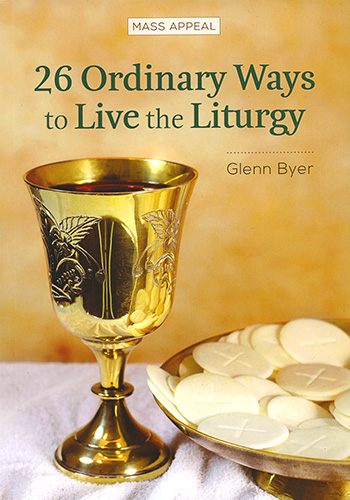
My reason for writing 26 Ordinary Ways to Live the Liturgy was to get a message out — life and so many of the things we do every day (or at least several times a year) are taken up and used in liturgical prayer.
For example, most people enjoy spending time with those close to their hearts. They love to be included or invited, but find it painful when they are left out. This is directly applicable to Mass. In theory, everyone in the neighborhood should be invited. Of course, it may be awkward and unfamiliar — learning new hand gestures, receiving curious stares and struggling with rhythmic cadences of sitting up and sitting down. But people need to know that visitors are welcome to our assemblies. And we need to understand that it is our duty to welcome them with open arms. We would do no less for new friends at a party. Because the invitation to liturgy comes first of all from God, this is crucial.
In my book I tell this story:
Friends of mine in Portland still remind me of the annual tree-decorating party we had on Saint Lucy’s Day (December 13), complete with the special cookies that had two raisins to represent her eyes that were plucked out during her martyrdom – and with the singing of Santa Lucia... Santaaaaaa Lucia! I doubt that we were on key, and we may not have even gotten the words right, but these events exercised our ritual muscles and our ability to celebrate. Someone had called, and someone had responded. That’s really all we need.
Invitations, gatherings, songs, stories, food — these are the key tools of our liturgy and the key tools of celebration in our secular lives. It is why we need to sings songs like Jesse Manibusen’s “All Are Welcome” or Dan Schutte’s “Gather the People.” It is also why we need songs like Bob Hurd’s “O Love of God/Amore de Dios,” since part of feeling welcome is to hear songs that are at least partially written in our own language. I know this first hand, because having lived in Italy for two years, there was nothing quite so comforting as attending Christmas Midnight Mass at Saint Peter’s basilica, feeling a little homesick on that holy night, and then hearing the first reading, “The people that walked in darkness….” It made me feel welcome — it took me back to all of my Christmases past. We should do at least as much on a Sunday in Ordinary Time.
And so, I hope that my book will help us all to take the ordinary tasks and celebrations of our life and find a home for them in the Mass. May we no longer keep our two lives (religious and secular) separate, but rather, incorporate them into one unified form of Christ’s love.

Glenn CJ Byer
Glenn CJ Byer has written widely on the liturgy, including articles on the meaning of the Constitution on the Sacred Liturgy, marriage preparation, the renovation of churches and the anointing of the sick. He speaks widely on the role of lay ministers in the Mass.
Learn more


